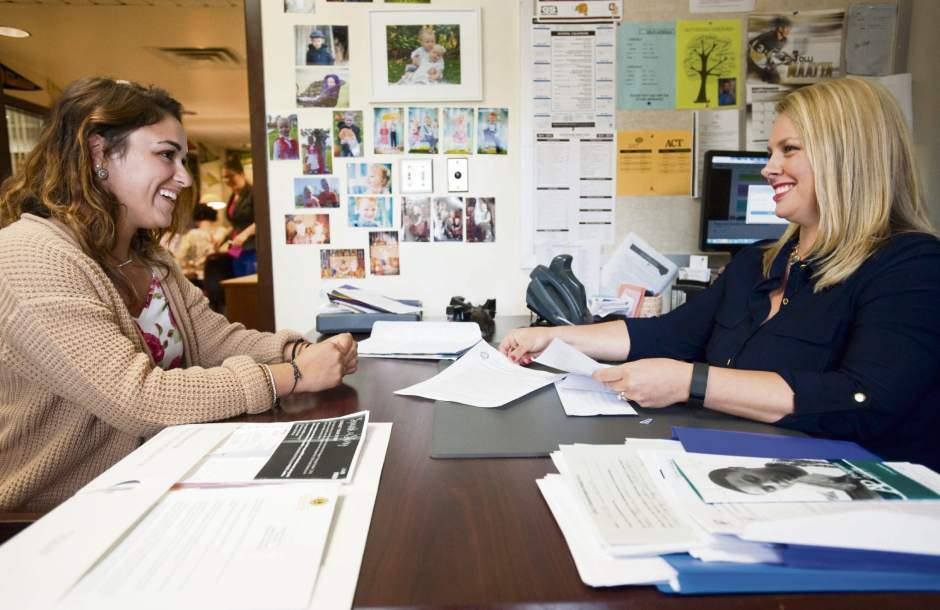Web-based platform helps high school students raise college funds
A new resource could help high school students as young as freshmen looking to lock down college scholarship cash and minimize student debt.
But finding it is not easy.
Nearly 20 Pennsylvania colleges and universities have signed on to Raise.me, a web-based platform that allows high school students to create a profile and begin amassing money in micro-scholarships for redemption when they enroll at a participating school. But the program has had a low-profile rollout, with many high school guidance counselors left scratching their heads about what it involves.
It targets would-be first-generation collegians with a two-fold message: These are the things you need to do to prepare for college, and there are ways to whittle down the tab.
High school students who sign on as freshmen can begin earning small awards — such as $50 or $200 — for a variety of accomplishments: from community service and extracurricular activities to hitting a grade-point target, having perfect attendance or snaring an A in an advanced placement course.
Student eligibility thresholds vary by college, as do the total award amounts.
The University of Pittsburgh recently joined the social enterprise program that included Carnegie Mellon University, Penn State and Clarion University of Pennsylvania.
Raise.me officials said more than 320,000 students across the country have signed up to earn scholarship money at the nearly 180 colleges and universities participating.
Pitt will offer total awards of up to $28,000 — or $7,000 a year redeemable over four years, according to spokeswoman Kate Ledger.
The university initially decided to target the neediest students. It limits participation to Western Pennsylvania high schools where 70 percent or more of students are eligible for the federal free or reduced lunch program and any individual student at other schools who qualifies for the subsidized lunch program.
Pitt made a special exception for Pittsburgh Public Schools, lowering the threshold to 50 percent participation in the school lunch program.
For Pittsburgh Public School students who earn the full $30,000 award available under the Pittsburgh Promise, the maximum extra $28,000 Raise.me award could go a long way toward financing a degree at Pitt's Oakland campus, where base undergraduate tuition is $17,688 a year.
At Greensburg Salem High School, where 42 percent of the 900 students in grades 9-12 are eligible for free and reduced lunches, guidance counselor Laura Klipa was happy to learn about the incentive.
“I could see how that would be a motivator for some students. ... Maybe seeing this as making college cost-manageable at an earlier age might be the tipping point for some of them,” Klipa said. “A lot of them, when they don't look at it until their junior or senior year, college seems out of grasp. If they start thinking about it from freshman year and there are family discussions, it might be something that motivates them each day and each year.
“I've begun telling my freshmen about it. I don't know if any of them have signed on yet,” she said.
Moreover, many of those students live within an easy commute to Pitt's Greensburg campus — a fact President Sharon Smith hopes is an additional incentive for students who want to hold down the cost of a degree by enrolling at the campus, where tuition is $12,688 this year.
Many of the schools participating are taking the same approach, leading critics to complain that the program offers little more aid than what ordinarily would be available.
Aneesh Raman, vice president of San Francisco-based Raise.me, explained the company's approach.
“In most cases, the micro-scholarships are part of the financial aid packages the schools would extend upon a student's enrollment,” he said. “But knowing such funds are available and can be earned early on can be a tipping point for students who fear college is beyond their reach.”
Ledger said Pitt is using a pool of money that it ordinarily taps for institutional aid, but some schools are putting up a new pool of cash for Raise.me.
At Clarion, where tuition is $7,238 a year, students in Western Pennsylvania schools can earn up to $8,000, or $2,000 a year redeemable over four years. Its awards are stacked on top of any other institutional aid students might receive.
“They see what they need to do to earn higher scholarships, and those who catch on can earn more scholarship money, making college affordable for them,” said David McFarland, director of scholarships.
Penn State said its maximum Raise.me award — $16,000 redeemable at $4,000 a year over four years — also comes on top of other aid the school offers.
The university offered Raise.me to a few high schools in the Philadelphia area beginning in 2014, and the first scholarship recipients are sophomores.
“At the end of their first year, those students had a higher grade-point average than students from the same high school. We see it as establishing expectations, patterns and habits that will make them more successful at Penn State,” said Jacqueline Edmondson, associate vice president and associate dean for undergraduate education.
Penn State last year added six rural schools, including Meyersdale, North Star, Rockwood and Salisbury-Elk Lick in Somerset County. Edmondson said the university is expanding its Raise.me outreach to eight more Allegheny County schools this year: McKeesport, West Mifflin, Steel Valley, South Allegheny, Perry, Brashear, Carrick and Allderdice.
Raise.me comes on the heels of the Obama administration's concerns that colleges are not reaching out enough to low-income and first-generation students, many of them stymied by the high cost and the confusing array of support.
“The increased transparency is really important,” Raman said. “It allows students to learn more about the process earlier. Otherwise, it's a black box for many.”
Debra Erdley is a Tribune-Review staff writer. Reach her at 412-320-7996 or derdley@tribweb.com.

